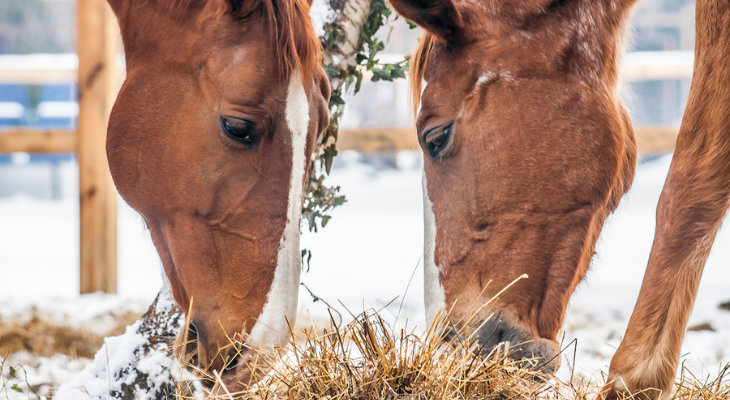
Feeding Tips to Keep Your Horse Healthy in the Winter
Your horse's ability to stay warm and healthy during the winter depends on the type of feed and forage available. Now that the temperature has dropped, it's time to make a few dietary changes in your barn. These tips will help you keep your horse comfortable this winter.
Increase the Amount of Forage You Provide
When it's cold outside, your horse expends more energy to stay warm. If you don't change the way you feed your horse, weight loss and cold stress can occur. Rutgers Equine Science Center recommends providing 1.5 to 3% of your horse's body weight in forage daily during the winter. Gradually increase the amount of feed you provide to allow time for your horse to adjust to the change in feeding practices.
Evaluate Your Horse's Condition
Age, hair length, the thickness of the fat layer, and previous exposure to cold weather all affect your horse's ability to handle cold temperatures. A horse that's recently traveled to Connecticut after spending its life in Florida will find it harder to adjust to cold and windy weather than an equine that's used to seasonal changes.
It's important to consider your horse's lower critical temperature (LCT) when making feeding changes. LCT refers to the outdoor temperature at which your horse must consume more feed to maintain its usual body temperature. A healthy adult horse with a winter coat has an LTC of about 18 degrees Fahrenheit, while a pregnant or young horse may have an LTC of 40F, according to the Equine Extension at Utah State University. If your horse is used to cold winters, it may not need to eat more until the temperature drops to 5F. Shivering can be a sign that your horse needs more calories, particularly if it lasts more than a few hours.
Choose Quality Forage
Body heat increases as your horse digests feed. Make the most of the digestive process by offering high-quality, long-stemmed hay rather than grain-based feeds. Hay takes longer to digest than grain and helps keep your horse warmer longer. Chopped hay may be a good choice for older horses that have trouble chewing, according to Equus. If your horse's weight starts to drop, you may need to supplement the forage with feed pellets, like those made of beet pulp.
Be sure to keep outdoor feeders full if your horse spends part of the day in the pasture. Place feeders under shelters or in sheds to prevent the forage from the elements.
Consider Adding Supplements to Your Horse's Diet
Winter forage may not contain the same amount of vitamins and nutrients as summer forage. Fortunately, vitamin and mineral supplements can provide horses with the extra nutrients they need to stay healthy. Ask your equine veterinarian if a multi-vitamin or a mineral supplement is a good idea for your horse during the winter.
Keep the Water Flowing
Water intake is just as important in the winter as it is in the summer. Make sure that water remains unfrozen and is available at all times. Your horse may drink more water if you make sure the water temperature is lukewarm on particularly cold days.
Do you have some concerns about your horse's winter diet or health? Get in touch with us and we'll help you ensure that your horse is prepared for the cold weather.
Sources:
Equine Extension at Utah State University: Caring for Horses in Cold Weather, 1/18
Rutgers Equine Science Center: Winter Feeding for Horses, 2/11
Equus: 5 Winter Feeding Tips, 10/22/21
Stable Management: Winter Nutrition for Working Horses, 1/29/19
